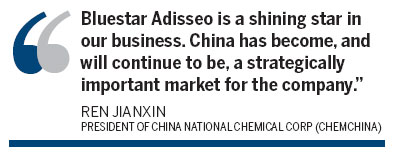Chemistry Special: ChemChina overseas subsidiary seeking Hong Kong offering
During his tenure as president of China National Chemical Corp (ChemChina), Ren Jianxin has been widely praised for his success in overseas acquisitions.
Ren is once again in the headlines as he leads one of the company's subsidiaries to an initial public offering (IPO) in Hong Kong.
The company's subsidiary Bluestar Adisseo Nutrition Group is seeking a $1.56 billion IPO in Hong Kong. It is offering 2.3 billion shares at HK$3.50 to HK$5.25.
ChemChina acquired French animal feed company Adisseo Group in 2006. Bluestar Adisseo is now the world's leading producer of methionine - an essential amino acid - in addition to vitamins and enzymes.
"Bluestar Adisseo is a shining star in our business," Ren said. "China has become, and will continue to be, a strategically important market for the company."
The parent company ChemChina will take advantage of its rich resources in China to give full support for development of Bluestar Adisseo, he added.
The company will use 40 percent of the IPO proceeds to expand and improve its European plants and another 40 percent to develop its feed business, said a company statement.
The move will help Bluestar improve its technology and management, making ChemChina ever-more multinational, said Ren.
Bluestar is now building a large plant in Nanjing to produce liquid methionine. The project is expected to come on stream in the second half of 2012 with a capacity of 140,000 tons.
The specialty chemical industry has big potential in China, said analysts. Although China has become the top market for chemicals, it is in great need of advanced technologies in the sector, they said.
Development of new materials and specialty chemicals is now the strategy for ChemChina.
Ren started his industrial cleaning business in 1984. He opened Bluestar Co in Lanzhou together with seven colleagues to provide the first professional industrial cleaning company in China.
Several years later Bluestar dominated China's industrial cleaning industry. In 1995 the company moved its headquarters from Lanzhou to Beijing.
Bluestar then made a series of acquisitions and by 2002 the company's total assets grew to 4 billion yuan.
As Bluestar became an important player in China's chemical sector, Ren began to work toward a bigger dream - building China's own chemical giant.
"After the Ministry of Chemical Industry was dismantled, China's chemical companies were scattered in a mess," he told China Daily in an earlier interview.
"I felt that building a chemical giant would further increase the competency of the industry."
Ren's view was supported by the central government. In 2004 Bluestar, China Haohua Chemical (Group) Corp and other chemical companies were merged to form ChemChina, the biggest chemical producer in the country.
"ChemChina focuses on the development of new materials and specialty chemical products," said Ren. "Now the country has become the world's largest chemical producer. Yet in fields that require advanced technology we still lag far behind the Western countries."
Overseas strategy
Ren began to eye overseas operations soon after ChemChina was established. In addition to Adisseo, the company bought the organic silicon business of Rhodia, another French company.
With the two acquisitions, it became China's largest investor in France.
"The two deals clearly identify our business focus - to be a leading company in new materials and specialty chemical products," said Ren.
The deals proved successful. Bluestar Adisseo had a turnover of 986 million euros in 2009 resulting in profits of 187 million euros.
"In order to achieve overseas development, a company has many options. You can form cooperation agreements with foreign companies, you can also open plants overseas," said Ren. "But for our company, I think the best choice is to make acquisitions. Through acquisitions we can have larger markets, get more advanced technology and have more talented people."
In 2007 ChemChina signed an agreement with US private equity firm Blackstone Group for up to $600 million for a 20 percent stake in ChemChina's subsidiary Bluestar.
It was the first time a State-controlled enterprise took on a foreign company as a strategic investor.
Now, total ChemChina assets have risen from about 20 billion yuan in 2004 to more than 170 billion yuan this year.
According to the Internet Corporate Identity System, the world's leading information provider for the chemical and oil industries, ChemChina ranked 19th on the list of top 100 global chemical enterprises in 2008.

(China Daily 11/18/2010 page15)








